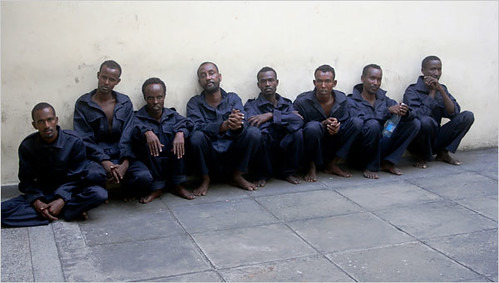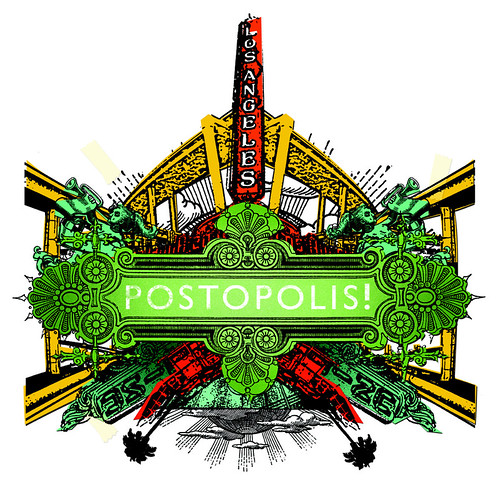A Portrait of Pirates

[Image: Photo by Associated Press.]
There is something striking about this portrait of recently captured Somali pirates being held at the Kenya Ports Authority Port Police station in Mombasa. How they are all lined up and seated together despite their detention, still as a tightly knit squad of nimble water thugs – only now without their boat, the necessary architecture for their crime. They’re formation appears much the same as I’d expect them to be perched down low in their little pirate dingy ready to pounce on the next vulnerable ocean liner that should pass through the lawless zone that is their territory.
It’s almost as if nothing has changed for them except their vessel has been literally pulled out from underneath their asses and they have only maybe barely realized it; even now, in the confines of a jail cell, they’re still without an inkling of what else to do – piracy was their livelihood, their instinct. They are now just fish out of water.
That’s probably an exaggerated reading of their faces.
But it’s interesting how those blue prison uniforms further emphasize their unity, inseparability, as if the deep sea blue material (a testament to their crime) has merely taken place of their boat itself; now held together only by sinewy threads of cotton; as if one tightly stitched entity had been arrested and not eight separate persons.
Perhaps even more critically, we are shown that the sea pirates are not just a loose string of single random incidents strewn across the region, or the world, for that matter, that we can bring together in a single police line up, but – as you have no doubt been reading the news – this issue is fast becoming a much more wholesome and costly threat to some extremely high stakes economic players who take great risk scooting their goods through that neck of the woods that is the enclave of “pirate polity.”
One other intriguing detail is the gridded concrete floor upon which this vessel-less outfit of gulf punks sits idly now, having replaced the ocean – once the terrain of their domain that afforded them great asymmetric platitudes and maneuverability within and off the grid to seize upon those lesser agile vessels of prize who are instead bound to the very rigidity of the ocean grid which defines the naval networks of global trade. Here, their craft has been taken from them and the landscape upon which they rest is an unebbing and waterless lattice of cold concrete slab, a symbolic flooring that visually enforces the notion of the state’s projective ability to render the global outlaws as subjects, or “prizes” of an all-powerful transnational cartography of state control.
Needless to say, unlike in this photo, their backs are hardly up against the wall.







7 Comments:
"Here, their craft has been taken from them and the landscape upon which they rest is an unebbing and waterless lattice of cold concrete slab, a symbolic flooring that visually enforces the notion of the state’s projective ability to render the global outlaws as subjects, or “prizes” of an all-powerful transnational cartography of state control."
This is a sad sentence. To realize that these poor former fishers once again have had their craft and way to feed their kids taken from them.
Once they were poor fishers. Then they were forced into piracy when the big comercial fishing fleets came into their waters after the Somali government had collapsed.
Just thought I'd also drop a youtube link about the situation.
http://www.youtube.com/watch?v=0I6xGCnWjJo
Yeah, don't really like the tone of this one. Who are these people? I don't hate them. Why? What they do is violent, they are pirates... Yes, I believe violence takes many forms and that when violence becomes structuralised, that it acts in much more sinister and insidious ways. So for me, these are the small-time guys, as Pontus has said, these are poor fishermen, who, coming from a nation which has been structurally nay systematically bombed and ignored into collapse by US and international politics, are victims. And as such, seeing them here doesn't immediately make me think of some nation state holding them as 'prize' as 'loot'. It just makes me think of desperate lives, of quite ordinary guys driven to something 'bad' out of desperation, poverty and (what I imagine to be) a total lack of possibility or options in life.
Just imagine, you grow up fishing, and start noticing that there's these big ships keep passing through your waters. (YOUR WATERS) And you're poor, and probably hungry, probably struggling, food on table, kids - empty bellies and that, and it occurs to you that there's more money in one of those ships than you've ever known to exist in your lifetime, I'd be straight out there with an RPG and some AKs, sorry guys...
I hear ya, and am with ya. I don't know ANYTHING about these men, or the roots of piracy there.
Pontus, thanks for the added bits of context. Though, does this mean I have to be sympathetic with all pirates, or with Somalia's piracy in general? I am not sure just yet. I can't say, that given the conditions, I can blame people for turning to piracy, or out of nationalism and poverty don't see what piracy serves for many folks there.
I guess I was just more interested in the photo itself, as a piece of media, an image taken by western media and featured in western media, and what it might suggest about the west's perceptions of pirates, and how the west would ideally like to try and frame them as these menacing now fish out of water.
I am certainly sympathetic to any struggle against the uneven tilts of global trade, and I would love to see more media coverage that gets at the real roots of the piracy there. I just thought this image was so very telling about how the west would try to have us view these pirates.
You are right. Behind all of that they look like men trapped in much larger matrix of political and economic forces. Will I say they are victims? No, not quite at this point.
I don't know nearly enough about the situation.
But, I appreciate the counter-view, and I quite agree with you both.
B
A good read here: 'Somalia: piracy and politics' by Georg-Sebastian Holzer
Aren't we full of ourselves, Mr Sub??
Doubtful that most viewers will get the 'grid'.
"Victims"?? Indeed...
great deconstruction of an amazing image.
Post a Comment
<< Home